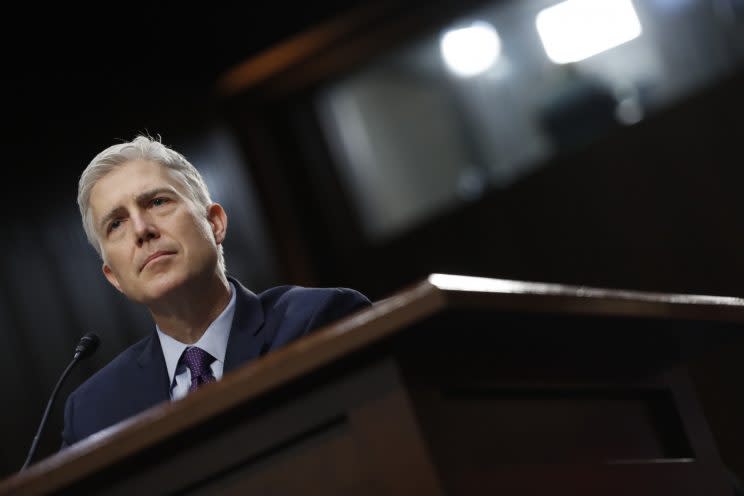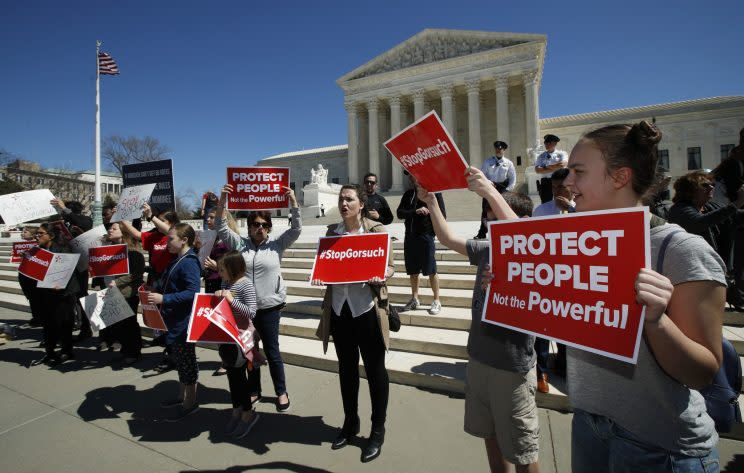Newly Sworn In Neil Gorsuch Could Impact Reproductive Rights Almost Immediately

Now that Supreme Court Justice Neil Gorsuch is here to stay for quite some time — he’s only 49 years old and could hold the bench for the rest of his life — there’s one looming question for women’s health proponents:
How will Gorsuch’s appointment affect coming cases on women’s reproductive rights?
As it happens, one of the first cases Gorsuch will hear could have big implications not only on this issue, but also for any group that faces potential discrimination on the basis of the religious beliefs held by a company.
The players in this case? Recycled tires and a preschool playground.
What, exactly, is the link to women’s health here? It’s complicated. The case of Trinity Lutheran Church of Columbia v. Pauley, centers around an incident involving the church’s application for a grant from the state of Missouri to use recycled tires for the surface of a new playground for Trinity’s preschool.
The preschool is clearly religiously affiliated, stating in its own materials that it “teaches a Christian world view … including the Gospel.” The preschool’s application ranked fifth out of 54 applications reviewed in total for Missouri’s Scrap Tire Program, but the state ultimately declined to award the church a grant to resurface the playground with recycled tires because doing so would have violated a provision of Missouri’s state constitution.
The constitution makes clear that “no money shall be taken from the public treasury, directly or indirectly, in aid of any church, sect or denomination of religion.” That meant no new playground for Trinity.
But the church challenged the decision in federal court. Both the district and appellate courts agreed with the state’s decision. Now the church will argue to the Supreme Court that its exclusion from eligibility for the recycled tire grant program violates the free-exercise and free-protection clauses of the U.S. Constitution.
What do recycled tires have to do with reproductive rights and Justice Neil Gorsuch? A whole lot, it turns out.
It’s a case that’s being closely watched by the National Women’s Law Center, Amy Matsui, senior counsel and director of government relations, tells Yahoo Beauty.
“If the court allows the church to receive public funds despite Missouri’s constitution, it opens the door to public funds going without any safeguards to groups that might discriminate,” Matsui explains. And that includes religious institutions or schools that could discriminate on the basis of sex, sexual orientation, and religion.
“We know there have been religious employers who have fired employees for using birth control, for becoming pregnant without being married, for using assisted reproductive technologies to achieve pregnancy. If an institution that is engaged in discriminatory practices can receive public funds, we have serious concerns if there are not any safeguards or protections. It’s a slippery slope,” Matsui says.
Further complicating the matter is Burwell v. Hobby Lobby Stores Inc.
While serving on the 10th Circuit, Gorsuch heard the Hobby Lobby case before it reached the Supreme Court. In the case, Hobby Lobby argued that the religious beliefs of its majority shareholders meant that the company should not be forced to provide employee insurance coverage for all the forms of contraception covered under the the Affordable Care Act.
In his opinion on the case, Gorsuch wrote that the ACA’s mandate, and its requirement that all plans cover all forms of FDA-approved contraception, forces corporations such as Hobby Lobby “to violate their religious faith by lending an impermissible degree of assistance to conduct [that] their religion teaches to be gravely wrong.”
“Will the way [Gorsuch] ruled in Hobby Lobby under the pretext of the Religious Freedom Restoration Act give us any signs about his willingness to see that churches and religious institutions also get public funding?” asks Matsui. “This will be a bellwether case.”
“One of the concerns is [Gorsuch’s use] of religious freedom claims to trump antidiscrimination protections, both in the context of reproductive rights and LGBT rights,” Brigitte Amiri, senior staff attorney with the American Civil Liberties Union Reproductive Freedom Project, tells Yahoo Style.
“We saw in both his Hobby Lobby decision and his Little Sisters of the Poor decision a troubling disregard for women employees who would lose contraception coverage as the court ruled in favor of their employers,” Amiri says of two of the cases heard by Gorsuch while on the 10th Circuit — both of which ultimately reached the Supreme Court — in which he sided with the religious rights of employers over the reproductive rights of employees.
And more of these kinds of challenges may end up before the Supreme Court now that it has sent the Zubick v. Burwell case it heard last March back to the appellate court for ruling.
The central issue of the Zubick case is whether groups already exempt from the contraception mandate — including religious organizations such as the Catholic Church — still have to accommodate their employees to ensure that they have access to contraception coverage as outlined in the ACA without actually providing that coverage themselves. The exception already allowed by the ACA for religious organizations is the completion of a form by the employer that allows employees to apply for contraception coverage directly with their insurance provider. But religious organizations say even this infringes on their religious liberties.
Thus far, almost all the lower courts that have ruled have done so in favor of the government, saying that the current means of exemption do not violate religious beliefs, but almost all the cases are still pending. As these cases continue, they could end up again in the Supreme Court. Though it’s unlikely that any Zubick-related cases would be heard this term, they are “certainly in the pipeline for next term,” says Amiri.
“The concern is that [Gorsuch] has ruled in a way that is more extreme than even the majority [on the Supreme Court] in Hobby Lobby. [Justice Samuel] Alito in writing for the majority [on the Supreme Court] realized that there would be an effect on female employees if employers were allowed to take contraception coverage out of their health insurance plans, and Gorsuch did not recognize that at all in his decision. He did not pay any attention to the effect this would have on women employees,” Amiri says.

When it comes to where Gorsuch stands on abortion rights, the picture still remains unclear.
“It’s hard to say, since he hasn’t written in the past about abortion restriction cases,” says Amiri, “so we don’t have past rulings to read to make any guess as to what he might do. But there have been serious concerns raised about his position on reproductive rights as a whole.”
Amiri continues, “But just last June, the Supreme Court upheld that women have the fundamental right to abortion and that states can’t use non-fact-based arguments to obstruct access to care. We hope this will continue regardless of this appointment. Whole Woman’s Health was decided in June 2016 in a 5-3 ruling. Even with Gorsuch’s appointment, the balance of that decision wouldn’t change. So we think that it is a strong decision and that the fundamental constitutional right to abortion has been affirmed over and over and over again. And we believe that will continue to be the base.”
And yet, says the National Women’s Law Center’s Matsui, “We have always taken the view that every justice on the Supreme Court makes a difference. It’s overly simplistic to say [Gorsuch] is a conservative jurist replacing a conservative jurist [Scalia]. If Judge Gorsuch is seen as being more persuasive with his colleagues than Scalia was, that has the potential to move the law in certain ways than another conservative vote may not be able to do.”
Read more from Yahoo Beauty + Style:
Follow us on Instagram, Facebook, and Pinterest for nonstop inspiration delivered fresh to your feed, every day. For Twitter updates, follow @YahooStyleand@YahooBeauty.
